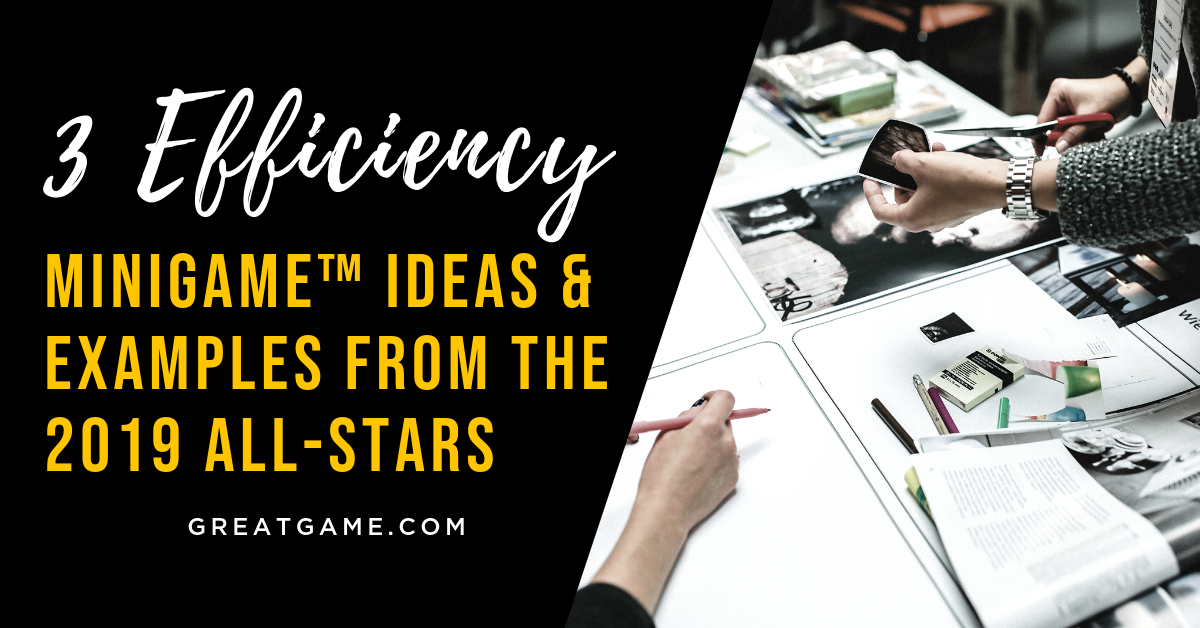
Looking for some MiniGame™ inspiration? A MiniGame is a targeted day-to-day improvement challenge aimed at correcting a weakness or pursuing an opportunity in your company. We've got three examples from our the 2019 Great Game All-Star Team demonstrating how they took advantage of opportunities and found solutions to their efficiency problems in these MiniGames:
Double O: On-Site
Theme: Hunting and Archery
Objective: Our crews had gotten lax in regards to where and how they began their days. This reduced efficiency on job sites cost the company unnecessary labor overages. The objective of this MiniGame was to get the crews to begin their days “On-Site” rather than their regular habit of coming into the shop and then heading to the jobsite after losing the start of the day. The secondary focus of this MiniGame was to get all field workers to arrive on time rather than a few minutes late as many associates had been.
Goal: At the time of this MiniGame, we had 16 men on job sites x a 10-week time frame x 5 days a week equaling 800 potential on-site starts where we could improve our efficiency. Our goals were divided among three levels.
- Level 1 - 480 on-site starts
- Level 2 - 560 on-site starts
- Level 3 - 640 on-site starts
The Players: Each team member needed to show up at the jobsite on time and all field leaders took attendance and called in their site results at the start of every day.
Time Frame: Ten Weeks
Scoreboard:

Prizes:
- Level 1 - 480 on site starts earned a logoed camo shirt with a bullseye.
- Level 2 - 560 on site starts earned a hunting theme party, grilling various types of meat.
- Level 3 - 640 on site starts earned a case of meat for each winner to take home from the party.
Benefits and Results: Our estimated cost of the inefficiency at the beginning of the workday equated to an hour of efficiency per employee, therefore about 800 hours in the time frame of the MiniGame. That total potential cost savings were estimated to be about $20,000 in this 10-week period if this problem was entirely eliminated.
The actual benefit of this MiniGame was a score of 690 on-site reports. This saved the company an estimated $17,250 in ten weeks, less the cost of the prizes and celebrations at $2,250. And the improved habits continue to this day for a significant ongoing benefit to the company.
Laser Light Technologies: Driving Overall Equipment Effectiveness
Theme: Golf
Objective: By increasing Overall Equipment Effectiveness (OEE), we meet our inventory requirements sooner, which allows us to use fewer resources to make the same revenue.
Goal: There are three segments of this MiniGame—the goal for each segment is calculated over a 1-month period.
- Goal #1 - June 11 to July 10, 2018 - 67% OEE rating
- Goal #2 - July 10 to August 8 - 75%
- Goal #3 - August 10 to September 8 - 85%
Benefit: Processes and long-term behaviors improved by continuously using fewer resources.
Time Frame: 90 days
Scoreboard:
Prizes: As the team achieved the predetermined percentage of OEE each month, they would earn the following prizes:
- Goal #1 achieved-Customized Cool Cup Goal
- #2-Golf Polo Shirt Goal
- #3-Golf Outing Game of Golf
Celebration:

Hildebrandt: Load to the Road
Objective: Reduce time to load equipment and tools accurately and eliminate return trips for forgotten tools.
Goal: Go from leaving the shop at 8:30 am to 8:15 am daily by December 20, 2017.
Time Frame: the first MiniGame we played from November 1 to December 20, 2017. We duplicated this MiniGame within the same time frame of 2018 with very similar results.
The Players: Most everyone in the company had a role to play:
- Sales had to make sure they had accurate notes in the jobs describing what tools and equipment would be needed.
- The office checked that jobs were correctly scheduled, and contacted the customers the day before to ensure that they knew our crews would be there the following day.
- Supervisors had to make sure crew assignments were accurate and planned out in advance.
- The production team members had to get their tools loaded and get moving efficiently each morning.
Scoreboard:
Prizes: The team earned points each day they were successful and lost points if tools were left at the shop. However, if they left the shop earlier than 8:15 am, there was a chance to earn bonus points.
- Level one - 80pts = a company hoodie shirt
- Level two - 120pts = three weeks of company-provided lunch on Friday
- Level three - 160pts = Arborwear brand company logo embroidered jackets
Benefits and Results: The cultural impact was that team members began to think through what tools they needed for jobs more thoroughly and were conscious of the time it took to load their trucks.
 There were many mornings that the shop was empty by 8:10 am and even 8:05 am. The team made better plans the day before to help expedite leaving the shop quickly the next day.
There were many mornings that the shop was empty by 8:10 am and even 8:05 am. The team made better plans the day before to help expedite leaving the shop quickly the next day.
The financial impact was that we generated an incremental $10,000 in revenue compared to the same time period the previous year!
Check out our MiniGames Toolkit to get guidelines and insights on setting up a successful MiniGame, real MiniGame examples, out 10-step design tool and more.
Other Articles You Might Like:
.png)










.png)
.png)
